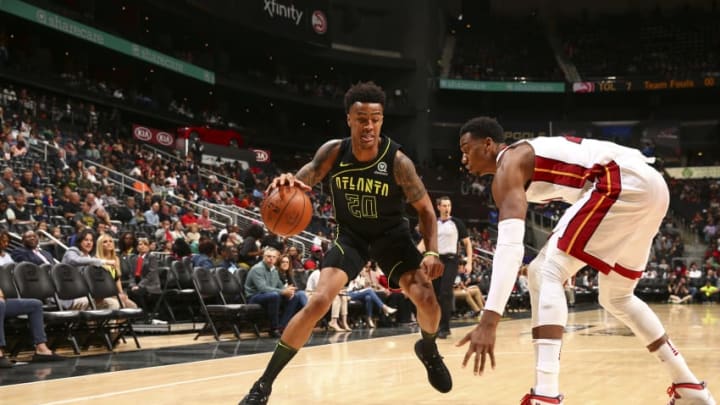Atlanta Hawks big man John Collins has followed up an impressive rookie season with an impressive sophomore campaign in 2018-19.
When the Atlanta Hawks selected Wake Forest big man John Collins with the 19th overall pick in the 2017 NBA Draft, the team probably hoped that he would eventually develop into a solid complementary piece that excelled at rolling to the basket.
What they got was one of the better sleepers in that class, as Collins averaged a respectable 10.5 points and 7.3 rebounds per game last year with an 18.3 Player Efficiency Rating and .145 win shares per 48 minutes.
Collins thrived chiefly because he didn’t fray too far out of his comfort zone; then-head coach Mike Budenholzer primarily used him as a screener and a roll man that played off of the likes of Dennis Schroder and Taurean Waller-Prince.
Fast forward to this year and Collins has played like a borderline All-Star, as the work he put in this summer to expand his offensive game has paid off so far. He looks like a better version of the player that earned NBA Second-Team All-Rookie honors a season ago.
🚨 John Collins (21 PTS ) is a perfect 10-10 from the field! 🚨#TrueToAtlanta 87#ThunderUp 82
— NBA (@NBA) January 16, 2019
WATCH FREE on NBALP: https://t.co/Ody70LeP5E pic.twitter.com/okTR26VkHw
Through 28 games this year, Collins is averaging 19.1 points, 10.4 rebounds and 2.4 assists a night with a 63.1 true shooting percentage. He already has more 20-plus point games than he did all of last year, which is more impressive when you factor in the 15 games he missed at the start of the season. His advanced numbers also went up, as his PER has jumped to 21.6 and his win shares per 48 minutes have increased to .152.
This isn’t a case of Collins putting up numbers on a bad team either; as of Jan. 16, the Hawks’ net rating goes from -12.0 to -2.6 when he is on the floor. The impact mainly shows on the offensive end, as Atlanta’s effective field goal percentage goes from 49.4 to 54.5 and they score 9.7 more points per 100 possessions when Collins plays. In short, the Hawks are better with Collins, but what has he specifically done to make that so?
Honestly, he’s simply getting more minutes and more chances to score. Tune into any Hawks game and you’ll see that there isn’t really anything different about his play style. Sure, he takes a few more 3s — as of Jan. 16, he’s shooting 1.8 more 3s per game than he did last year — but outside of that, he’s still the same springy big that prefers to finish off possessions with layups and dunks.
Trae lobs to John Collins for the one-handed flush!#TrueToAtlanta 68#ThunderUp 89
— NBA (@NBA) December 1, 2018
WATCH on #NBA League Pass: https://t.co/L3VurkatG8 pic.twitter.com/6XRqVUVJOW
The team is simply making an effort to give Collins more of those opportunities. His usage rate has gone up from 17.9 last year to 23.3 this year, with 74.6 percent of his field goal attempts emanating from inside 10 feet, which is actually a slight decrease from last year (76.7 percent) — likely because of the increase in catch-and-shoot 3s (2.1 per game, up from 0.6 last year).
However, his minutes boost while playing alongside rookie point guard Trae Young — who, if nothing else, looks like he’ll be a good passer at the NBA level — has nearly doubled his attempts from that range (from 5.2 per game last year to 10.1 this year). He’s still very efficient from that area of the floor, making 66.3 of his attempts — though it is down from the 71.8 percent mark from his rookie campaign. It’s the same methods, just with a higher quantity and quality.
He doesn’t keep the ball in his hands very long either; 72.8 percent of his shots come after holding the ball for less than two seconds and he only shoots after 3-6 dribbles 5.8 percent of the time. He’s basically a DeAndre Jordan/Rudy Gobert-type player with a little bit of range, though he isn’t nearly as impactful on the defensive end as those guys are (-1.3 defensive box plus/minus).
With that being said, the Hawks almost certainly won’t become the team they want to be with Collins as their best player. Even as the NBA evolves into a pace-and-space, 3-point-happy league, good teams still need star players that can create their own shot or create open looks for others. As much as Collins has improved, he isn’t at that level yet.
Still, he’s established himself as a good, young supplementary player that will fit in perfectly with Young and Kevin Huerter when/if they develop into perennial All-Stars. Those young guards remain question marks, but Collins is the closest thing Atlanta has to a budding star and at only 21 years old, he has plenty of time to get even better.
